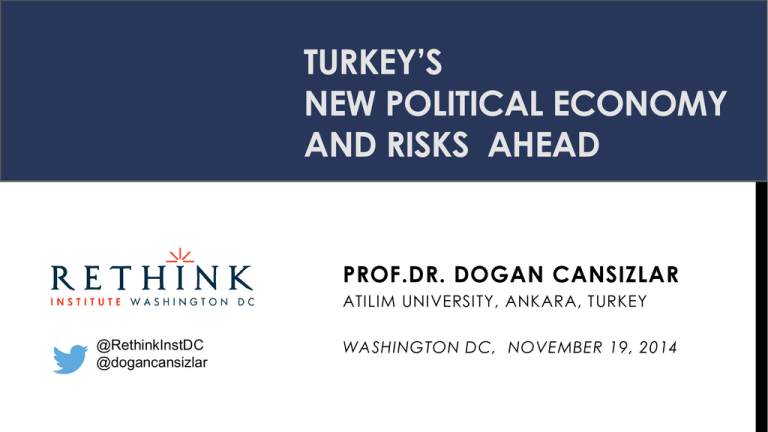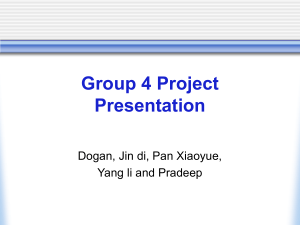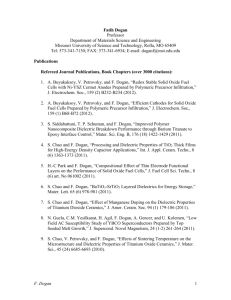Turkey`s New Political Economy
advertisement

TURKEY’S NEW POLITICAL ECONOMY AND RISKS AHEAD PROF.DR. DOGAN CANSIZLAR ATILIM UNIVERSITY, ANKARA, TURKEY @RethinkInstDC @dogancansizlar WASHINGTON DC, NOVEMBER 19, 2014 POLITICAL OVERVIEW •Turkey is a unitary parliamentary republic. •The judiciary is independent of both the legislature and the executive •The Grand National Assembly has 550 members elected for 4 years term, •The Justice and Development Party (AKP) has held power since 2002. •The presidential election on 10 August 2014 was the first in Turkey’s history where the president was elected by public vote. -Former Prime Minister Erdogan won with 51.8% of the vote. •The next general elections will be held in June 2015. •A Constitutional Court is entitled to cancel legislation passed by the Parliament ( if incompatible with the Constitution ). PROF. DOGAN CANSIZLAR - RETHINK INSTITUTE - NOVEMBER 19, 2014 I. ECONOMIC OVERVIEW Turkey has a developed market economy, with a rich history of private enterprise. With a GDP of $ 821.9 billion ( 2013 ) and a purchasing power parity per capita at $ 18.975 ( 2013 ), Turkey ranks among the biggest 20 economies of the world. Turkey is the world’s 17th largest economy and Europe’s 6th largest economy Additionally Turkey is Europe's seventh largest trading partner, while Europe is Turkey's main partner, accounting for around half its trade. PROF. DOGAN CANSIZLAR - RETHINK INSTITUTE - NOVEMBER 19, 2014 I. ECONOMIC OVERVIEW •Turkey is one of the 10 Big Emerging Markets -advanced emerging economy •Following an economic crisis in 2001, Turkey undertook major structural changes in the finance sector, which, coupled with subsequent economic and political stability, led to an average GDP growth rate of 5% since 2002, the fastest among the OECD countries, which grew at an average of 1.7 %. PROF. DOGAN CANSIZLAR - RETHINK INSTITUTE - NOVEMBER 19, 2014 I. ECONOMIC OVERVIEW •During the global economic crisis Turkey suffered a contraction of - 4.8 % in 2009. •Due to favourable global liquidity conditions created by stimulus packages and rising capital inflows in Turkey, the economy registered a strong return to growth of 9.2% and 8.8 % in 2010 and 2011 respectively. - 2.2% in 2012 and 4% in 2013. PROF. DOGAN CANSIZLAR - RETHINK INSTITUTE - NOVEMBER 19, 2014 I. ECONOMIC OVERVIEW •Turkey’s net debt to GDP ratio is 36.3 % in 2013 (below Maastricht Criterion of 60 %). •Similarly, Turkey’s budget deficit/GDP ratio in 2013 is 1.2 %, (below Maastricht Criterion of 3 % ), one of the lowest rates in Europe. •Turkish exports has exceeded $152 billion in 2013. •Large and growing domestic market has enabled a record in imports with $252 billion. •It is a full member of European Union (EU) Customs Union since 1996. PROF. DOGAN CANSIZLAR - RETHINK INSTITUTE - NOVEMBER 19, 2014 I. ECONOMIC OVERVIEW •The Turkish financial sector is well developed in both technology and legal procedures. •Turkish finance is primarily built upon universal banking system and related areas like ; -Insurance, leasing, factoring and stock brokerage. •Turkey's banking sector after the crisis in 2001 is reinforced with economic reforms. •Turkish banking sector is one of them most robust among European Banks. PROF. DOGAN CANSIZLAR - RETHINK INSTITUTE - NOVEMBER 19, 2014 II. PROBLEMS OF TURKISH ECONOMY Economic Growth depends on import and foreign financing, Low growth rate ( 3.0 % in 2014, 4.0 % in 2013, 2.1 % in 2012 ), High unemployment rate ( 10.1 % , August 2014 ), double digits, High current account deficit ( 5.7 % of GDP , 2014 ), Relatively low domestic savings ( 12.6 % of GDP ) Chronic inflation ( 9.8 %, since 2004 ), High foreign debt stock of private sector ( $ 278 billion 2014/2Q ) PROF. DOGAN CANSIZLAR - RETHINK INSTITUTE - NOVEMBER 19, 2014 II. PROBLEMS OF TURKISH ECONOMY •Vulnerable to external shocks ( exchange rate risk, FED`s QE, ECB QE ), -In next 12 months, Turkey needs US $ 210 billion Repayment 170 Current Account 40 -Portfolio investment : US $ 134 billion ( August 2014 ) •A significant part of Turkey’s large current account deficit has been financed by net errors and omissions ( statistical discrepancy ) - $ 7.6 billion ( January - September 2014 ), - $ 36.0 billion ( 2002 – 2014 / September ) prompting many to speculate on the sources of these funds. PROF. DOGAN CANSIZLAR - RETHINK INSTITUTE - NOVEMBER 19, 2014 II. PROBLEMS OF TURKISH ECONOMY •Turkey’s growth model is based on channeling external financing to credit and consumption. -Less employment-generating than before. •Turkish Central Bank faces growing political pressure to cut interest rates despite rising inflation. PROF. DOGAN CANSIZLAR - RETHINK INSTITUTE - NOVEMBER 19, 2014 III. NEW ECONOMIC REFORM PROGRAM •The new program, announced recently by the prime minister is a nine-point reform package including measures to boost productivity in such key sectors as trade, energy and health. •The new government program envisages ; - Increasing the gross domestic product (GDP) from $820 billion in 2013 to $1.3 trillion by 2018. - Reducing the Current Account Deficit from 7.9 percent to 5.2 percent, PROF. DOGAN CANSIZLAR - RETHINK INSTITUTE - NOVEMBER 19, 2014 III. NEW ECONOMIC REFORM PROGRAM - lowering the Unemployment Rate from 9.8 to 7 percent by the end of 2018. - Minimizing Turkey's dependency on import (particularly foreign energy imports ) and foreign capital. No sign for structural reforms ; ( constituition, election system,political party legislation, tax structure, energy etc..) •Industrial inventory …..only wishes… •The same Economic Reform Program in February 2012. PROF. DOGAN CANSIZLAR - RETHINK INSTITUTE - NOVEMBER 19, 2014 IV. CURRENT RISKS, TRENDS AND CHALLENGES •For most of the past decade, Turkey's economy has been an example of stable growth, fiscal discipline, and a heaven for foreign direct investment although there are some problems mentioned before. •In the last couple of years, however, the Turkish economy began to exhibit some problems largely due to political intrusions and overly populist policies. PROF. DOGAN CANSIZLAR - RETHINK INSTITUTE - NOVEMBER 19, 2014 IV. CURRENT RISKS, TRENDS AND CHALLENGES •Turkey has faced during the past year ; -Significant political and economic challenges like ; -Gezi Park protests ( May 2013 ), -High-level corruption allegations (December 17 and 25, 2013 ), -Plummeting Turkish lira, -Stagnant economic growth rates, -Decreasing trust in the judiciary, -Heavy-handed politics into the economic life, PROF. DOGAN CANSIZLAR - RETHINK INSTITUTE - NOVEMBER 19, 2014 IV. CURRENT RISKS, TRENDS AND CHALLENGES -Regional instabilities in the neighborhood, - Russia’s conflict with Ukraine and the EU, Sanctions - Middle East is boiling, -The Islamic State of Iraq and the Levant (ISIL) using "extreme violence" and imposing “ rule of terror " . - The Kurdish Peace Process, a critical initiative of the AKP. -"Zero problems with neighbors" policy turns "maximum problems with neighbors." PROF. DOGAN CANSIZLAR - RETHINK INSTITUTE - NOVEMBER 19, 2014 IV. CURRENT RISKS, TRENDS AND CHALLENGES •After winning three general elections, several local elections and, ultimately, the presidency of the country under one single party ; -The majority is driving minorities in society to desperation in recent years, particularly in the last two years, increase the concerns about the ‘majoritarian authoritarianism’. PROF. DOGAN CANSIZLAR - RETHINK INSTITUTE - NOVEMBER 19, 2014 IV. CURRENT RISKS, TRENDS AND CHALLENGES •These days, one can increasingly hear that Turkey is becoming less democratic and more authoritarian. •People bemoan the decline of the rule-of-law, argue Turkey will finally (and inevitably) become a Middle Eastern country where the rule of law is no more. •But the Constitutional Court in Ankara has become more active and has used its powers to enlarge individual freedom by annulling the controversial piece of legislation. PROF. DOGAN CANSIZLAR - RETHINK INSTITUTE - NOVEMBER 19, 2014 IV. CURRENT RISKS, TRENDS AND CHALLENGES •Since a major corruption and bribery investigation became public on Dec. 17, 2013, -the government has been working to reshape the judiciary and justice system so as to prevent the investigations from deepening and to halt the launch of similar probes. PROF. DOGAN CANSIZLAR - RETHINK INSTITUTE - NOVEMBER 19, 2014 IV. CURRENT RISKS, TRENDS AND CHALLENGES •A new draft bill that will allow the government to bring more people loyal (169 new members) to itself into both the Supreme Court of Appeals ( penal ) and the Council of State ( administrative ) appeals courts. •The government already took over the control of the key judicial council, ( HSYK ), responsible for appointments, promotions and removal of personnel within the judiciary ( judges and proscuters ), through the elections in mid-October. PROF. DOGAN CANSIZLAR - RETHINK INSTITUTE - NOVEMBER 19, 2014 IV. CURRENT RISKS, TRENDS AND CHALLENGES •Government `s ; -Arbitrary audits harassing local and foreign investors for political reasons, -Lavish public expenditure, -Replacement of the economic team with political loyalists, -Attempt to sink a successful and publicly listed bank, risking an impact on entire financial sector. PROF. DOGAN CANSIZLAR - RETHINK INSTITUTE - NOVEMBER 19, 2014 IV. CURRENT RISKS, TRENDS AND CHALLENGES -The government began ; -Prosecuting journalists, -Violating due process in cases against political foes from the army to academia, -and bid-rigging to hound perceived opponents in the old business dynasties, PROF. DOGAN CANSIZLAR - RETHINK INSTITUTE - NOVEMBER 19, 2014 IV. CURRENT RISKS, TRENDS AND CHALLENGES -Political pressure on decisions of Independent Authorities, -Central Bank - TCMB (interest rate policy), -Banking Regulatory and Supervisory Authority - BDDK, -Capital Market Board – SEC, PROF. DOGAN CANSIZLAR - RETHINK INSTITUTE - NOVEMBER 19, 2014 IV. CURRENT RISKS, TRENDS AND CHALLENGES •Crony capitalism ; - If not close to the ruling party, very little chance of ; -finding a position in public service, -winning tender from government projects, either. •The polarization, marginalization and the corruption escalated in recent years. PROF. DOGAN CANSIZLAR - RETHINK INSTITUTE - NOVEMBER 19, 2014 IV. CURRENT RISKS, TRENDS AND CHALLENGES •With this ; -crony capitalism , -polarization, -marginalization, -deteriorating freedom of speech -and attack on freedom of the press problems caused question marks for investors and capital/brain drain, also. PROF. DOGAN CANSIZLAR - RETHINK INSTITUTE - NOVEMBER 19, 2014 IV. CURRENT RISKS, TRENDS AND CHALLENGES •Another controversial reform bill giving investors jitters. -The burden of proof has almost shifted from the prosecutor to the defendant, simply because it takes just reasonable suspicion* for the court to confiscate assets, for maybe years. •Remembering how long these cases can last, which would substantially degrade their value and may even end their commercial viability. *from corpus delicti (fundamental fact necessary to prove the perpetration of a crime ) to reasonable suspicion. PROF. DOGAN CANSIZLAR - RETHINK INSTITUTE - NOVEMBER 19, 2014 IV. CURRENT RISKS, TRENDS AND CHALLENGES •New legislation being considered by the Turkish parliament allowing also the seizure of property from those accused of conspiring against the government is causing concern among domestic and foreign investors. •The homeland security reform bill will give police new powers in search, seizure, detention and arrests, while restricting the rights of suspects and their attorneys to acquire the details of legal proceedings brought against them during an investigation. •It would also make it possible for the government to seize the assets of people and groups convicted of threatening Turkey’s constitution or trying to overthrow the government. PROF. DOGAN CANSIZLAR - RETHINK INSTITUTE - NOVEMBER 19, 2014 IV. CURRENT RISKS, TRENDS AND CHALLENGES •The rules don`t comply with EU standards. •Turkey’s EU bid is already stalled, -concerns about regressing rather than progressing with democratic reform. PROF. DOGAN CANSIZLAR - RETHINK INSTITUTE - NOVEMBER 19, 2014 IV. CURRENT RISKS, TRENDS AND CHALLENGES •Turkey is vulnerable because of its reliance on foreign capital flows as ending QE of FED and rising US yields pull investor interest away from emerging markets. PROF. DOGAN CANSIZLAR - RETHINK INSTITUTE - NOVEMBER 19, 2014 IV. CURRENT RISKS, TRENDS AND CHALLENGES •From an economic standpoint, recent government actions causing uncertainty in economy are not likely to be greeted with warmth by foreign investors. •In such an unhealthy environment, foreign investment may well decline, and it will be more difficult to attract other businessmen and firms to invest in Turkey. PROF. DOGAN CANSIZLAR - RETHINK INSTITUTE - NOVEMBER 19, 2014 V. BANK ASYA INCIDENT •Bank Asya is one of the 4 participation banks in Turkey, subject to banking law and capital market law since some 54 percent of Bank Asya shares is listed (of that, half is held by foreign investors ), •Pro-government newspapers have carried almost daily reports on Bank Asya's trouble, portraying it as a failing bank and calling for the banking watchdog (BDDK) to intervene. •President has denied any effort to undermine Bank Asya, but said ; "It's being said that there are efforts being made to sink a bank. There is no work being done to sink a bank. This bank has already failed “. PROF. DOGAN CANSIZLAR - RETHINK INSTITUTE - NOVEMBER 19, 2014 V. BANK ASYA INCIDENT •But both regulators ( BDDK and SPK ) did not act to stop the publication of such reports and statements although they are authorized in legislation. •For the regulator to seize a bank - which it could only do after a long series of precursory steps - the bank would have to have problems meeting its obligations and paying its depositors. PROF. DOGAN CANSIZLAR - RETHINK INSTITUTE - NOVEMBER 19, 2014 V. BANK ASYA INCIDENT •Attacks have affected the bank's reputation over the last 10 months. •The government revoked Bank Asya's license to collect taxes and social security premium on behalf of the state in August of 2014. •Bank Asya lost more than 25 percent of its cash deposits, because public entities and several state-owned and pro-government firms have withdrawn more than $ 2 billion from the bank. PROF. DOGAN CANSIZLAR - RETHINK INSTITUTE - NOVEMBER 19, 2014 V. BANK ASYA INCIDENT •BİST added to the bank's troubles by imposing a five-week trading ban on its shares.( politically motivated action ). •Now Bank Asya in Watch List Market of BIST. •Additionally, talks on a possible takeover bid between Bank Asya and Qatar Islamic Bank failed, PROF. DOGAN CANSIZLAR - RETHINK INSTITUTE - NOVEMBER 19, 2014 V. BANK ASYA INCIDENT •Other prominent companies have also been targeted. •Most recently, on Oct. 1, Turkey’s cabinet decided to rescind the permission of Kimse Yok Mu (Is Anybody There), a charity connected to the movement, to collect donations and permission to create relief campaigns. •Bank Asya`s share price has plummeted 70 percent since mid-December last year, •But Bank Asya has a capital requirement rate of 18.35 ( September 2014 ) PROF. DOGAN CANSIZLAR - RETHINK INSTITUTE - NOVEMBER 19, 2014 THANK YOU PROF.DR. DOGAN CANSIZLAR DOGANCANSIZLAR@GMAIL.COM PROF. DOGAN CANSIZLAR - RETHINK INSTITUTE - NOVEMBER 19, 2014







